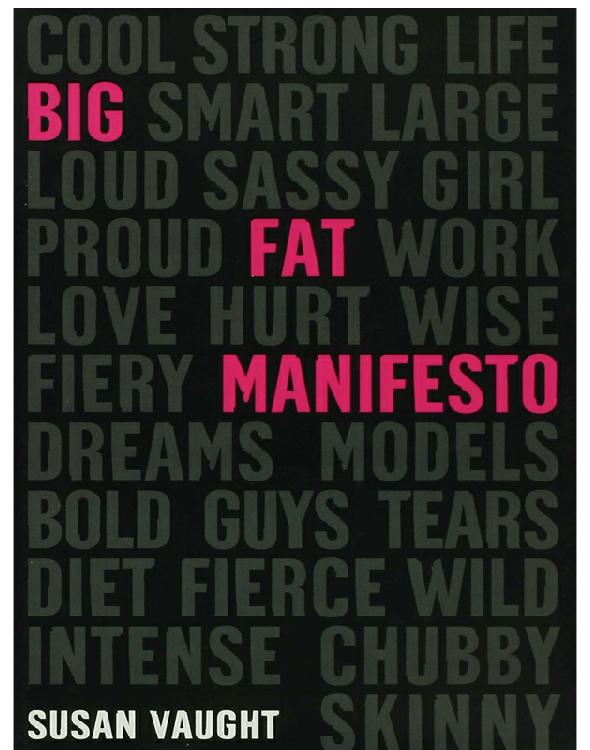
Big Fat Manifesto
فرمت کتاب
ebook
تاریخ انتشار
2009
Lexile Score
800
Reading Level
3-4
ATOS
5
Interest Level
9-12(UG)
نویسنده
Susan Vaughtشابک
9781599905068
کتاب های مرتبط
- اطلاعات
- نقد و بررسی
- دیدگاه کاربران
نقد و بررسی

January 7, 2008
High school senior Jamie Carcaterra is not just fat; as she puts it, “I am THE Fat Girl, baby.” In an attempt to enlighten fellow classmates about the indignities and injustices she faces daily, Jamie writes a weekly feature for her high school paper and calls it the Fat Girl Manifesto. The manifesto could land her a journalism scholarship for feature writing, which she desperately desires. Vaught (Trigger
) upends stereotypes about fat girls via Jamie’s bracing, take-no-prisoners columns and in Jamie’s first-person account of her year. The supremely confident Fat Girl persona is hard to resist, and more believable than many of the situations the author piles on: the fat boyfriend who undergoes risky gastric bypass surgery and suffers complications; the overblown media reaction to Jamie’s columns; the blossoming romance with the handsome high school paper’s editor-in-chief. The novel reads in places more like a rant than an emotionally involving story, and much of the Fat Girl Manifesto will be familiar (vanity sizing, the ineffectiveness of fad diets, etc.). But teens who persevere will be rewarded with some priceless scenes, such as Jamie and friends going undercover to document the discriminatory behavior of sales clerks in a clothing boutique; and with carefully prepared revelations, especially Jamie’s eventual awareness that she may be more limited by her anger than by her weight. Thought-provoking and, frequently, vigorous. Ages 12-up.

January 1, 2008
Gr 9 Up-High school senior Jamie Carcaterra doesn't apologize for being fat. In fact, she proclaims her fatness from the rooftopsor from the pages of her school newspaper, to be exact, in an attempt to win a college journalism scholarship. Jamie explores issues such as discrimination, health, stereotypes, and more in this engaging novel, which includes her columns as well as her first-person narrative. Despite her outspokenness, the teen nevertheless struggles to come to terms with her weightrefusing to eat in public and feeling a mixture of shame and anger when an insensitive doctor examines her. It's her boyfriend's decision to have weight-loss surgery, however, that drives the plot. His medical trials raise questions for Jamie, and for readers. Is obesity more dangerous than surgery? Is it worth risking your life to be thin? While Jamie and her friends sometimes come across as overly quirky and eccentric, readers will generally root for these appealing outsiders. Jamie is a strong, interesting character who grows over the course of the novel, recognizing her own contradictions. This is a powerful story for readers of any weight."Miranda Doyle, San Francisco Public Library"
Copyright 2008 School Library Journal, LLC Used with permission.

December 15, 2007
Jamie says it loud: shes fat, and if shes not exactly proud about it, shes willing to stand up for herself. She does this in her Fat Girl column in the school paper, where she discusses the stares and slights and the trials suffered by the overweight and obese, and also stands up for fat rights. The column becomes even more personal when Jamies boyfriend, Burke, decides to have his stomach stapled, and the details of whats involved make copy fodder. (The descriptions of frothing and dumping are particularly vivid.) Vaught writes Jamie big, loud, and earthy, but shows her vulnerabilities, tooespecially her near-panic as Burke gets thinner. Some plot elements are contrived (Burkes elective surgery takes place in the middle of senior year), and Jamies girlfriends never seem quite real. But this still speaks forcefully about fat issues to those who have experienced themas well as to those who havent.(Reprinted with permission of Booklist, copyright 2007, American Library Association.)

























دیدگاه کاربران